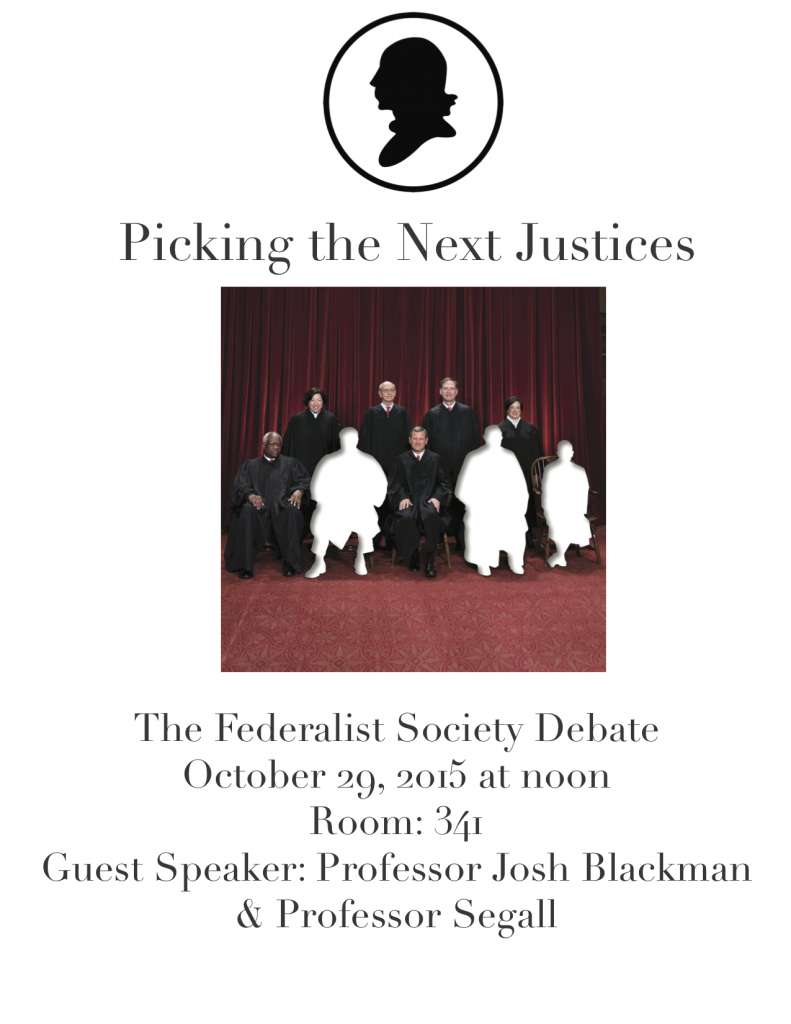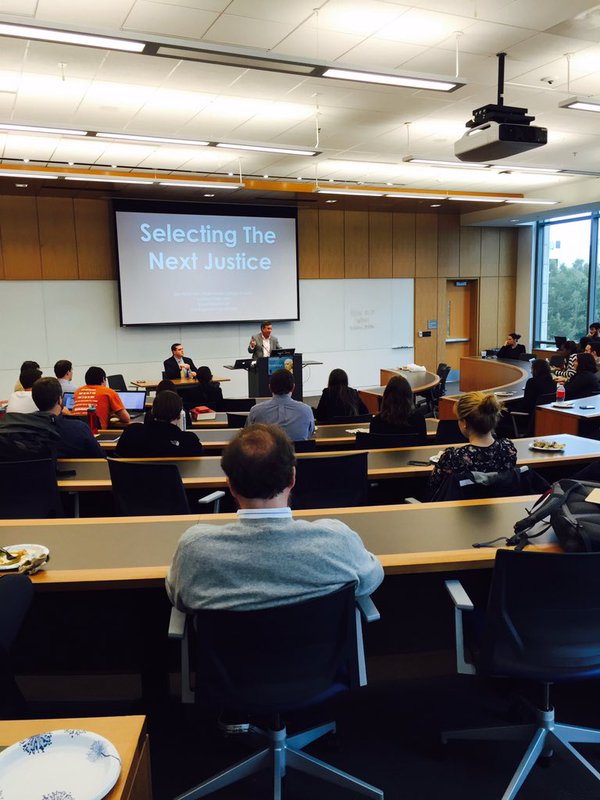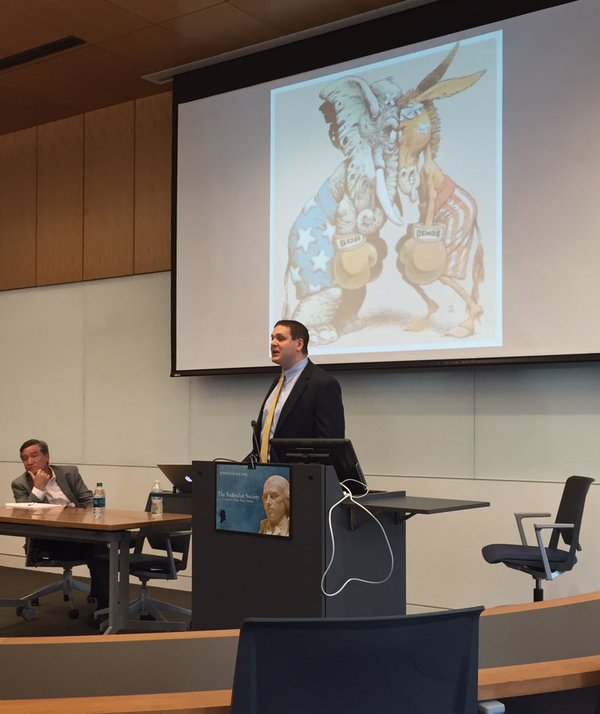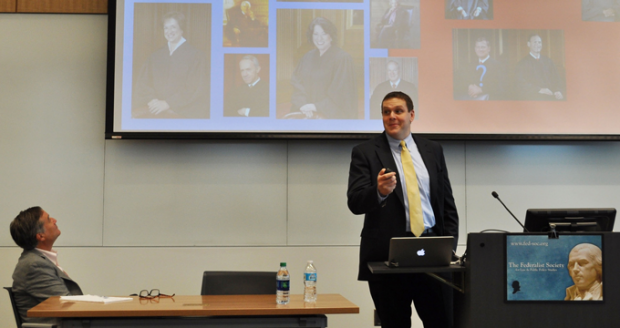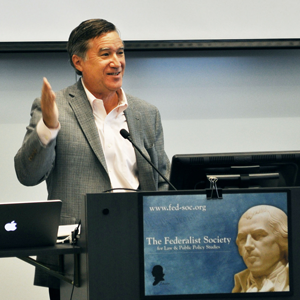On Thursday, Eric Segall and I debated the topic of Selecting the Next Justice at the Georgia State Federalist Society Chapter. It was a lot of fun.
Update: Georgia State offered this lengthy writeup of the event–someone was taking notes:
Eric J. Segall, Georgia State University Kathy and Lawrence Ashe Professor of Law, faced off againstJosh Blackman, associate professor of law at the South Texas College of Law, during a riveting debate, “Picking the Next Justices,” on Oct. 29 for the Georgia State chapter of The Federalist Society.
Appointing U.S. Supreme Court justices is perhaps the most important decision the next two or three presidents may make, Blackman said.
An aging court—four justices will be well over 85 in 10 years —means that several appointments are likely to occur within the next three presidential cycles.Of the last 16 justices appointed, 12 have been chosen by five Republican presidents and four by two Democratic presidents. Over the years, Blackman said, a significant number of justices appointed by Republicans have drifted to the left in varying degrees.
“Republicans have been pretty lousy at picking justices who adhere to the views that perhaps they want,” Blackman said.
The Ronald Reagan nomination of Robert Bork and subsequent blocking by Democratic opposition set a precedent that nominations could be stopped, Blackman said. Reagan’s next nominee, Douglas H. Ginsburg, also was strongly contested. That’s how the moderate Anthony Kennedy sailed through—he was a compromise to avoid another fight. “It’s a decision that has been haunting Republicans for 30 years,” Blackman said.
That’s why his first piece of advice in picking the next justice is to be prepared to fight. “A bruising confirmation battle is worth the political capital for a lifetime appointment,” he said. “A justice survives long beyond a presidential administration…. If it’s a qualified judge, try it again.”
Both Blackman and Segall agreed that ‘paper trails’ are an asset for candidates. “No more blank slates,” Blackman said. “We need to know how a judge views the Constitution.”
They differed however, in what a potential justice should be asked while being vetted.
Blackman said judges shouldn’t be given a litmus test, and asking their opinion on current issues is pointless.
“We need to focus on the Constitution and not issues du jour. A president can’t understand what the big constitutional case will be. You don’t know what the next big thing will be,” Blackman said.
Professor Eric Segall said nominees should be questioned about their stance, to ascertain how thoughtful they are regarding important decisions.
Segall said nominees should be questioned about their stance, to ascertain how thoughtful they are regarding important decisions.
“How do you feel today about either the second amendment or a case A vs. B?” Segall asked.The biggest disagreement was whether or not it is admirable for justices to brood over decisions and fluctuate on opinions.
The president should “pick people with courage who can stand up for their principles and not people who vacillate and go with wherever the wind goes,” Blackman said. “The law requires a sense of certainty.”Segall dissented. “If you’re about to decide whether Roe vs. Wade is about to be overturned … agonize about it, think about it,” Segall said. “It’s hard, it affects the whole world… it’s that characteristic ‘I might be wrong, so I might change my mind’… That’s what we need. So I hope when the next Supreme Court vacant seat occurs, it’s not just that ‘we want this person because they do what we want’ … what we want are people who will take their jobs seriously, humbly and with deference.”
Segall said humility is the single most important characteristic one should look for when appointing a justice.
“What we need are men and women who understand we don’t vote for them, we can’t fire them, they don’t stand for election, and they should only interfere with our government when it’s absolutely necessary or when the Constitution is absolutely clear,” Segall said.
As far as the Constitution is concerned, the two disagreed over whether original meaning matters.
Blackman said it’s imperative prospective justices be asked questions such as ‘how do you understand the original meaning of the second amendment,’ and ‘how do you understand the original meaning of the due process clause’ to test their knowledge of the history of the Constitution.Segall said an ‘original’ would have no idea what we are talking about in most cases, and that no member of the Supreme Court has ever been consistent in caring for originals.
“No judge goes back to the 1800s to figure out what they would have done,” said Segall. “It’s an impossible task. They all decide cases by today’s values. … It’s the burden of proof that matters.”
They also argued over what constituted judicial activism.
“There has been a very serious shift within the Federalist Society to move away from this notion of judicial restraint because the archetype of restraint in our modern era is the chief justice’s decision in Obamacare,” Blackman said. “I think you will see less conservatives saying we want no more judicial activism because of the Obamacare decision. I think it’s created a shift in how people look at the Supreme Court.”
Segall shot back: “What they’re saying is, ‘he reached a result different than the one we wanted, and therefore it was not judicial restraint,’ and that is the problem with America’s discussion on the Supreme Court today. These people would say ‘restraint, restraint, restraint, restraint,’ and they wanted that for really one reason, reverse rule. … The very message of the Federalist Society is restraint—excuse me, used to be. Because it turns out, once they got control of the Court, now restraint is not so good anymore.”
